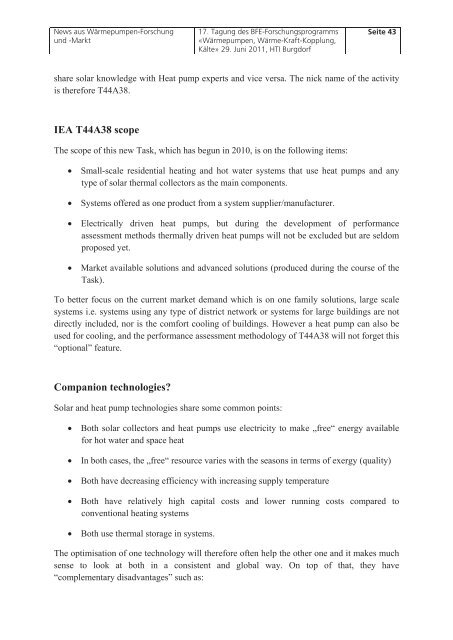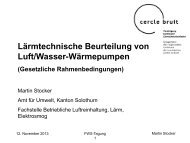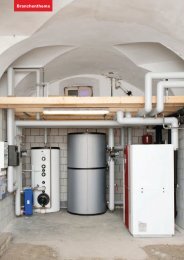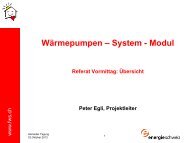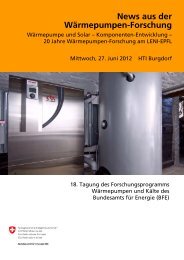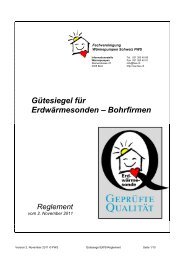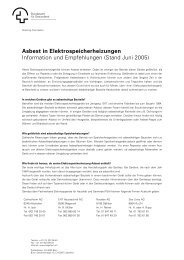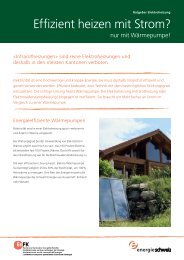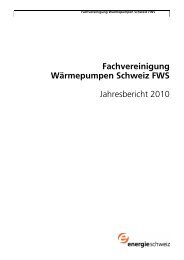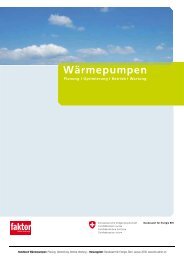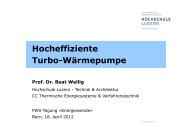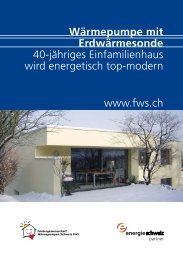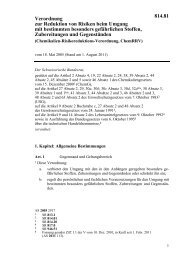News aus Wärmepumpen- Forschung und -Markt - FWS
News aus Wärmepumpen- Forschung und -Markt - FWS
News aus Wärmepumpen- Forschung und -Markt - FWS
Sie wollen auch ein ePaper? Erhöhen Sie die Reichweite Ihrer Titel.
YUMPU macht aus Druck-PDFs automatisch weboptimierte ePaper, die Google liebt.
<strong>News</strong> <strong>aus</strong> <strong>Wärmepumpen</strong>-<strong>Forschung</strong><br />
<strong>und</strong> -<strong>Markt</strong><br />
17. Tagung des BFE-<strong>Forschung</strong>sprogramms<br />
«<strong>Wärmepumpen</strong>, Wärme-Kraft-Kopplung,<br />
Kälte» 29. Juni 2011, HTI Burgdorf<br />
Seite 43<br />
�<br />
share solar knowledge with Heat pump experts and vice versa. The nick name of the activity<br />
is therefore T44A38.<br />
IEA T44A38 scope<br />
The scope of this new Task, which has begun in 2010, is on the following items:<br />
� Small-scale residential heating and hot water systems that use heat pumps and any<br />
type of solar thermal collectors as the main components.<br />
� Systems offered as one product from a system supplier/manufacturer.<br />
� Electrically driven heat pumps, but during the development of performance<br />
assessment methods thermally driven heat pumps will not be excluded but are seldom<br />
proposed yet.<br />
� Market available solutions and advanced solutions (produced during the course of the<br />
Task).<br />
To better focus on the current market demand which is on one family solutions, large scale<br />
systems i.e. systems using any type of district network or systems for large buildings are not<br />
directly included, nor is the comfort cooling of buildings. However a heat pump can also be<br />
used for cooling, and the performance assessment methodology of T44A38 will not forget this<br />
“optional” feature.<br />
Companion technologies?<br />
Solar and heat pump technologies share some common points:<br />
� Both solar collectors and heat pumps use electricity to make „free“ energy available<br />
for hot water and space heat<br />
� In both cases, the „free“ resource varies with the seasons in terms of exergy (quality)<br />
� Both have decreasing efficiency with increasing supply temperature<br />
� Both have relatively high capital costs and lower running costs compared to<br />
conventional heating systems<br />
� Both use thermal storage in systems.<br />
The optimisation of one technology will therefore often help the other one and it makes much<br />
sense to look at both in a consistent and global way. On top of that, they have<br />
“complementary disadvantages” such as:


